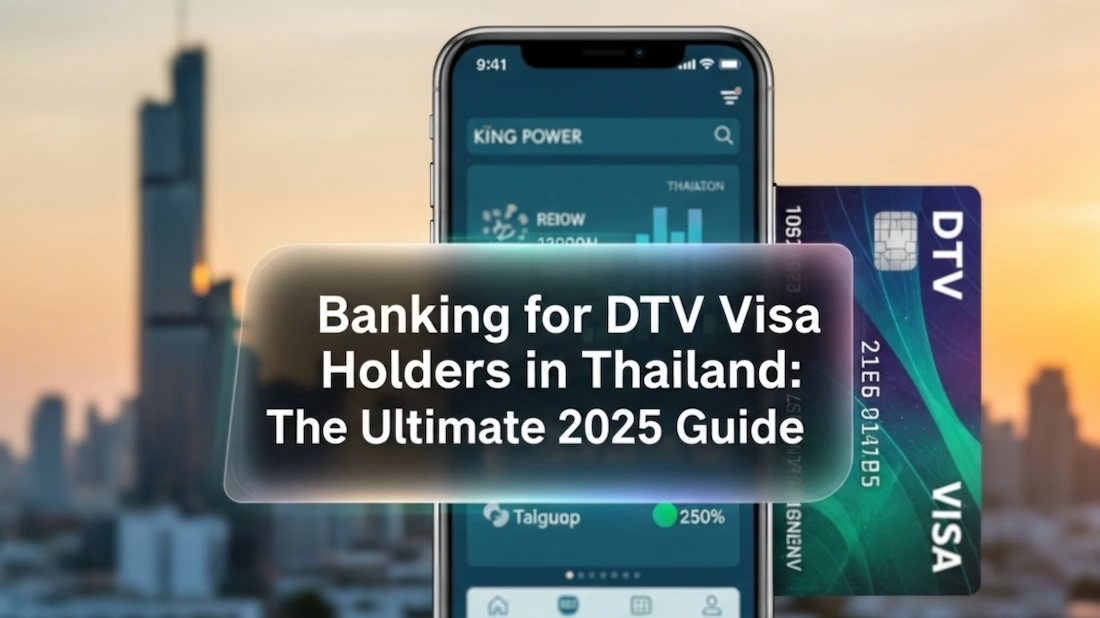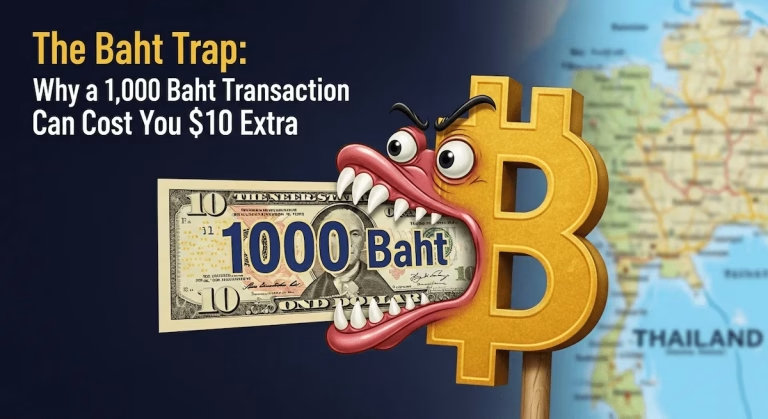
For digital nomads, Muay Thai students, and long-term travelers, the Destination Thailand Visa (DTV) introduced in 2024 was a game-changer. It offers a 5-year, flexible stay in the Kingdom. However, this excitement is quickly met with a critical, and increasingly difficult, challenge: opening a Thai bank account.
This guide provides the most complete overview available, integrating official requirements, news reports, and first-hand accounts to explain why this problem exists and what the real solutions are in 2025.
1. What is the Destination Thailand Visa (DTV)?
Before tackling the banking issue, it’s essential to understand the visa itself. The DTV is a long-term tourist visa designed for specific groups.
The Destination Thailand Visa (DTV): A Comprehensive Overview
| Feature | Details |
|---|---|
| Visa Validity & Type | 5-Year, Multiple-Entry Visa. |
| Period of Stay | 180 days are granted upon each entry into Thailand. |
| Extension of Stay | You can extend your stay once per entry for an additional 180 days. This allows for a continuous stay of nearly one year. The extension must be done at a Thai Immigration office and costs 1,900 THB. |
| Application Process | You must apply from outside Thailand. This can be done in person at a Royal Thai Embassy/Consulate or online via the official Thai e-Visa website (where available). |
| Eligible Applicant Categories |
|
| Core Application Requirements |
|
2. The Core Problem: Why Opening a Thai Bank Account is Now So Difficult
To make it clear: If you are struggling to open a bank account on a DTV visa, it is not you, it’s the system. In 2024 and 2025, Thai banks, under intense pressure from the government, have severely tightened their policies for foreigners.
The Reasons Behind the Crackdown
- Combating “Mule” Accounts: The primary driver is a nationwide crackdown on sophisticated financial crime. Criminal syndicates were using foreigners on various visas to open “mule” accounts to launder money from online gambling, romance scams, and other illegal activities.
- High-Profile Fraud Cases: There have been serious cases involving bank employees helping criminals forge documents to open accounts, leading to a massive loss of trust and a mandate for stricter internal controls.
- The DTV’s Official Classification: Despite its 5-year validity, banks officially classify the DTV as a special type of tourist visa. Under the new, strict rules, tourist-category visas are explicitly ineligible for opening new bank accounts. (Source: Bangkok Post)
Important Notice: This affects both new applicants and existing account holders. There are widespread reports on expat forums and social media of foreigners on DTVs having their long-standing accounts suddenly frozen or being asked to close them during routine ‘Know Your Customer’ (KYC) reviews.
3. How to Open an Account in 2025: The Two Paths
Given this new reality, there are only two viable paths to opening a Thai bank account.
Path 1: The DIY Method
Attempting to open an account by yourself is now a long shot, with a very high chance of rejection. Success depends entirely on finding a lenient branch manager who is willing to bend the official rules. If you attempt this, you must be meticulously prepared.
Minimum Requirements
- Passport: Your original passport with a valid DTV visa.
- Proof of Address in Thailand: This is non-negotiable. The best options are:
- A Certificate of Residence obtained from the Thai Immigration Bureau. This is the gold standard and your most powerful document.
- A long-term lease agreement (e.g., for 6 or 12 months) in your name.
- Supporting Documents:
- Your Tax Identification Number (TIN) from your home country.
- A reference letter from your home bank.
- Proof of funds (e.g., a bank statement showing the 500,000 THB required for the DTV).
- Minimum Deposit: Usually 500 – 2,000 THB in cash.
Path 2: The Institutional Guarantor Method
This has become the most reliable, and for many, the only way for DTV holders to open an account. Because banks no longer trust unknown individual applicants, they now rely on established, accredited Thai institutions to act as a guarantor.
This model works best for DTV holders in Thailand for “Soft Power” activities, such as studying at a large Muay Thai gym or a professional cooking school. The school, having been vetted by the bank, essentially vouches for you.
How the Guarantor Model Works in Practice
Established institutions that cater to long-term foreign students have started creating formal partnerships with specific banks to solve this problem. Here is what to expect from such a service:
- Eligibility: This service is typically offered exclusively to official students who are enrolled in a long-term course at that specific institution.
- The Institution’s Role (The “Guarantee”): A legitimate guarantor doesn’t just provide a simple letter. They prepare a comprehensive dossier for the bank to establish trust. This package often includes:
- Official accreditation (e.g., from the Ministry of Education).
- The school’s business registration and licenses.
- Proof of financial stability, such as high-revenue tax filings (banks may look for annual revenues of 30 million baht or more).
This extensive documentation proves to the bank that the institution is a trustworthy, high-value partner and not a “visa mill,” which is the bank’s primary concern.
- The Process: A staff member from the institution will typically schedule an appointment and physically accompany you to a specific, pre-arranged bank branch. This hands-on assistance is crucial as it signals to the bank that you are part of a trusted, formal partnership.
- Associated Costs: Expect to pay a service fee directly to the institution for this coordination and guarantee service. Fees can vary, but a common price point is around 5,000 THB. This is separate from any standard fees the bank itself may charge for opening the account.
- Potential Restrictions: Be aware that due to strict international banking regulations and risk assessments, these guarantor services may not be available for nationals from certain countries. Common examples of excluded nationalities can include (but are not limited to) Russia, India, Pakistan, China, Nigeria, and others. It is essential to ask about any nationality-based restrictions upfront before paying for a course or a banking service.
Comparison: The Two Paths to Opening a Bank Account
| Feature | Path 1: DIY Method | Path 2: Institutional Guarantor |
|---|---|---|
| Likelihood of Success | Very Low. Success is rare and depends entirely on finding a lenient bank manager willing to override official policy. | High. This is the most reliable method, as the bank trusts the accredited school/institution to vet the applicant. |
| Key Requirement | A Certificate of Residence from Immigration is the bare minimum, plus a complete set of supporting documents and a lot of luck. | Proof of enrollment in a large, accredited institution (e.g., Muay Thai school, cooking school) that has a partnership with a bank. |
| Primary Challenge | Finding a bank branch that will say “yes”. You will likely face multiple rejections. | Finding an eligible school that offers this specific service, and ensuring you are not from an excluded nationality. |
| Cost | Standard bank fees only (if successful). | A service fee to the school (e.g., 5,000 THB) in addition to any standard bank fees. |
| Best For | Those with no other option who are prepared for a long and potentially fruitless search. | DTV holders enrolled in “Soft Power” courses. This is the recommended path for anyone who is eligible. |
4. Managing Your Finances Without a Thai Bank Account (Essential Plan B)
Because opening a local bank account can take time you must have a robust financial strategy ready for your first days and weeks in Thailand. Relying solely on your home bank card and cash withdrawals comes with significant costs and inconveniences that can be easily avoided.
The Daily Reality: High Fees and Limited Acceptance
Using your foreign debit card at a Thai ATM typically incurs a 220 THB local bank fee, plus any fees your home bank charges. These costs add up quickly with multiple withdrawals. While major hotels and restaurants accept foreign credit cards, many smaller businesses, local markets, and street food stalls are cash-only.
Furthermore, when paying with a foreign card, you’ll often be presented with ‘Dynamic Currency Conversion’ (DCC), which offers to charge you in your home currency at a very poor exchange rate. Golden Rule: Always choose to be charged in Thai Baht (THB).
Your Financial Lifeline: Modern Fintech Tools
This is where planning ahead is crucial. To bypass these high fees and limitations, savvy travelers prepare by setting up accounts with modern financial technology (Fintech) companies before they arrive. These services act as your financial bridge until you secure a local account.
Important Note on Revolut and Wise:
- Revolut: You generally cannot open a Revolut account with a Thai address. You must open your account and receive your physical card in your home country BEFORE you leave for Thailand. Once set up, its card is an excellent tool for daily spending, allowing you to avoid high ATM fees and poor exchange rates at the point of sale.
- Wise: You can open a Wise account from Thailand. However, getting a physical Wise debit card delivered to a Thai address is often not possible. Its primary strength for DTV holders is sending money from your home currency to a Thai bank account at an excellent rate once you finally get one open.
Essential Financial ‘Plan B’ Tools: A Comparison
| Service | Best For | Crucial Caveat |
|---|---|---|
| Revolut | Daily spending with a physical card. Allows you to avoid high foreign card ATM fees and poor exchange rates at the point of sale. | MUST open the account and receive the physical card in your home country BEFORE arriving in Thailand. You generally cannot apply for one with a Thai address. |
| Wise | Sending larger sums of money from your home country TO a Thai bank account at a low cost and excellent exchange rate. | The physical Wise debit card is generally not available for delivery to Thailand. Its primary function for DTV holders is as a transfer service, not for daily card spending. |
5. Final Checklist: Your 2025 Action Plan
Navigating Thai banking on a DTV has fundamentally changed. Success now requires acknowledging the new landscape and choosing the right strategy.
- Understand the DTV Visa Itself: Know its rules, duration, and limitations before you arrive.
- Acknowledge the Banking Difficulty: Accept that opening a bank account is no longer a simple administrative task. It is a major hurdle that requires a specific strategy.
- Choose Your Path: Your first decision is whether to attempt the difficult “DIY” route or the more reliable “Guarantor” path.
- If Using a Guarantor: Contact your school or institution immediately to ask if they provide bank account assistance. This is your most likely path to success. Confirm costs and any nationality restrictions.
- If Going DIY: Your primary mission is to get a Certificate of Residence from Immigration. Without it, your chances are close to zero. Be prepared for multiple rejections.
- Arrange Your Financial “Plan B” Before You Travel: Set up a Revolut account (or similar) with its physical card before you leave your home country. This will be your financial lifeline for daily spending upon arrival.
Reliable Resources & Official Links
In a rapidly changing regulatory environment, relying on official sources is critical. Bookmark these websites for the most accurate and up-to-date information.
- Thai Immigration Bureau: This is your primary source for all official visa rules, including the DTV, extension requirements, and the process for obtaining a Certificate of Residence. Official Website: immigration.go.th
- Thai Revenue Department: Essential for understanding your tax obligations, especially regarding the new rules on foreign-sourced income for tax residents. Official Website: rd.go.th/english
- Official Bank Websites: For current requirements, service fees, and branch locations. Always check the specific bank’s website before visiting.
- Bank of Thailand (BOT): The central bank’s website provides overarching financial regulations and official announcements that affect all commercial banks. Official Website: bot.or.th/en
- Official Websites of Financial Tools: For the latest fees and terms of service for your “Plan B” tools.







